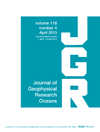
JOURNAL OF GEOPHYSICAL RESEARCH-OCEANS
Scope & Guideline
Exploring the Depths of Oceanic Discovery
Introduction
Aims and Scopes
- Ocean Dynamics and Circulation:
Focus on the physical processes governing ocean currents, eddies, and circulation patterns, including the role of mesoscale and submesoscale features. - Biogeochemical Cycles:
Investigation of the interactions between biological processes and chemical constituents in the ocean, including nutrient cycling, carbon dynamics, and the impacts of climate change. - Ocean-Atmosphere Interactions:
Research on the exchanges between the ocean and atmosphere, including heat, momentum, and gas fluxes, and their implications for weather and climate variability. - Coastal and Estuarine Processes:
Examination of the dynamics of coastal and estuarine systems, including sediment transport, freshwater influences, and the impacts of human activities. - Climate Change and Marine Ecosystems:
Studies addressing the effects of climate variability and change on marine ecosystems, including shifts in species distributions and changes in primary productivity. - Remote Sensing and Observational Techniques:
Application of remote sensing and in situ observational methods to monitor and analyze oceanographic phenomena, enhancing understanding of ocean variability.
Trending and Emerging
- Impact of Climate Change on Ocean Systems:
There is a growing emphasis on understanding how climate change affects ocean temperatures, sea level rise, and ecosystem dynamics, indicating a shift towards addressing global climate challenges. - Mesoscale and Submesoscale Processes:
Research on mesoscale and submesoscale ocean phenomena is gaining traction, reflecting an increased recognition of their significant roles in ocean circulation and biogeochemical cycles. - Ocean Health and Ecosystem Services:
Emerging research is focusing on the health of marine ecosystems and the services they provide, such as carbon sequestration and biodiversity, linked to anthropogenic impacts. - Technological Innovations in Oceanography:
There is an increasing trend in the use of advanced technologies, including machine learning and autonomous underwater vehicles, for data collection and analysis in oceanographic research. - Interdisciplinary Approaches to Ocean Studies:
Research integrating physical, chemical, biological, and geological oceanography is on the rise, reflecting a holistic approach to understanding ocean systems.
Declining or Waning
- Traditional Physical Oceanography:
Research solely focusing on classical physical oceanography principles has seen a decline, likely due to the increasing integration of interdisciplinary approaches that combine physical, chemical, and biological oceanography. - Static Models of Ocean Processes:
The reliance on static or simplistic models for ocean processes is decreasing as more complex, dynamic modeling approaches are favored to capture the intricacies of ocean interactions. - Localized Studies in Favor of Global Perspectives:
There is a noticeable waning of studies focused exclusively on localized ocean phenomena, with a growing emphasis on understanding global and interconnected oceanic processes. - Conventional Sampling Techniques:
Traditional methods of ocean sampling are being supplanted by advanced technologies such as autonomous vehicles and remote sensing, leading to fewer papers focusing on older sampling techniques.
Similar Journals

TELLUS SERIES A-DYNAMIC METEOROLOGY AND OCEANOGRAPHY
Unveiling the Secrets of Our Climate and OceansTELLUS SERIES A-DYNAMIC METEOROLOGY AND OCEANOGRAPHY, published by Stockholm University Press, is a prestigious open-access journal that has been at the forefront of research in the fields of atmospheric science and oceanography since its inception in 1983. With an enduring commitment to disseminating high-quality, peer-reviewed research, the journal has achieved a commendable impact factor, securing its position in the Q2 category for both Atmospheric Science and Oceanography as of 2023. The journal's significant reach is reflected in its Scopus rankings, being positioned at Rank #51 in Oceanography and Rank #77 in Atmospheric Science. With open access established since 2012, TELLUS SERIES A serves not only as a vital resource for researchers and professionals in these dynamic fields but also as an inclusive platform for budding scholars and students. Engaging with this journal allows readers to stay updated on the latest developments and groundbreaking discoveries that advance our understanding of climate systems and marine environments. Its editorial ethos emphasizes the cross-disciplinary integration of atmospheric and oceanographic studies, making it an essential publication for anyone invested in environmental research and policy.
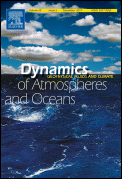
DYNAMICS OF ATMOSPHERES AND OCEANS
Exploring the Interplay of Earth's Atmospheres and OceansDYNAMICS OF ATMOSPHERES AND OCEANS, published by Elsevier, is a renowned journal that has established itself as a vital resource in the fields of atmospheric science, oceanography, and geology. With a rich publication history stretching from 1976 to 2024, this journal provides a platform for high-quality research that addresses the complex interactions between the atmosphere and oceans, which are critical to understanding climate change and environmental systems. It enjoys a respectable impact factor and a reputable position within its category quartiles, specifically noted as Q2 in critical domains such as Computers in Earth Sciences and Oceanography. Researchers and professionals benefit from its indexed coverage, featuring a Scopus ranking that places it among the leading journals in its categories. Although it is not an open-access journal, readers can access its cutting-edge articles through institutional subscriptions or individual purchases. The journal aims to foster cross-disciplinary dialogue and innovation by publishing original research, reviews, and insightful commentary, making it a cornerstone for scholars, students, and practitioners committed to advancing knowledge in the dynamic interplay of Earth's atmospheric and oceanic systems.

OCEANOGRAPHY
Exploring the Depths of Ocean ScienceOCEANOGRAPHY is a premier journal dedicated to the field of ocean sciences, published by the esteemed OCEANOGRAPHY SOC. With an impressive Q1 ranking in Oceanography and a Scopus standing of #25 out of 145 in Earth and Planetary Sciences, this journal serves as a critical platform for disseminating high-quality research. Since its inception in 1992 and transitioning to an Open Access model in 2007, OCEANOGRAPHY has been committed to providing unrestricted access to groundbreaking studies, fostering collaboration and innovation within the international scientific community. Researchers, professionals, and students alike can explore a wide range of topics, including marine ecosystems, ocean circulation, and climatic influences, making it an essential resource for anyone invested in understanding our oceans. With its headquarters in Rockville, MD, USA, it brings together a diverse body of work that is pivotal for advancing knowledge in the critical arena of oceanography.
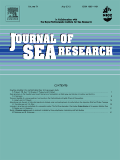
JOURNAL OF SEA RESEARCH
Empowering Researchers to Shape Marine UnderstandingJOURNAL OF SEA RESEARCH, published by Elsevier, is a premier academic journal dedicated to advancing knowledge in the fields of aquatic science, ecology, and oceanography. Since its inception in 1996, this journal has provided a vital platform for researchers and professionals to disseminate groundbreaking findings and promote fostering interdisciplinary discussions. With its impressive Q2 ranking in multiple categories, including Aquatic Science and Ecology, Evolution, Behavior and Systematics, it positions itself as a significant contributor to marine and environmental studies. The journal is accessible in both print (ISSN: 1385-1101) and online formats (E-ISSN: 1873-1414), ensuring wide reach and engagement within the scholarly community. Researchers and students alike will find the journal not only a reliable source of information but also a source of inspiration for future explorations. With a commitment to quality and a broad scope that spans fundamental to applied research, JOURNAL OF SEA RESEARCH remains an indispensable resource for understanding the complexities of marine environments and their relevance to our changing world.
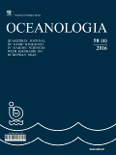
OCEANOLOGIA
Pioneering Insights in Ocean EngineeringOCEANOLOGIA, a distinguished academic journal published by the Polish Academy of Sciences, Institute of Oceanology, serves as a pivotal platform for researchers and professionals in the fields of Aquatic Science, Oceanography, and Ocean Engineering. Established in 1973 and transitioning to Open Access in 2011, this peer-reviewed journal promotes the dissemination of high-quality research across its diverse scope of ocean-related topics, aligning with its commitment to advancing marine science. With a notable impact factor underscored by its positioning in the Q1 and Q2 quartiles of recognized categories, OCEANOLOGIA stands out with impressive Scopus Rankings, including 49/247 in Aquatic Science and 24/105 in Ocean Engineering, reflecting its significance in the global research landscape. The journal's dedication to publishing cutting-edge studies ensures that it continues to influence both academic discourse and practical applications in ocean-related fields, making it an essential resource for students, researchers, and professionals aiming to contribute to the advancement of oceanic studies.
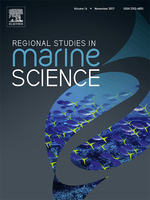
Regional Studies in Marine Science
Advancing Knowledge for Sustainable SeasRegional Studies in Marine Science, published by Elsevier, is a leading academic journal dedicated to advancing the understanding of marine ecosystems and their regional dynamics since its inception in 2015. With an ISSN of 2352-4855, this journal is indexed in Scopus and has achieved impressive ranking quartiles, notably Q2 in categories like Animal Science and Zoology, and Ecology, showcasing its relevance and impact in these fields. As of 2023, it ranks in the 79th percentile for Animal Science and Zoology, reflecting its significant contribution to academic discourse. While the journal operates under a traditional access model, its rigorous peer-review process ensures the publication of high-quality research that is crucial for understanding ecological interactions and fostering sustainable practices within marine environments. Researchers, professionals, and students alike will find this journal an invaluable resource for the latest findings and advancements in marine science, as it strives to bridge the gap between research and practical application at regional and global levels.
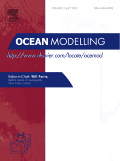
OCEAN MODELLING
Exploring Ocean Dynamics Through Advanced Modeling.OCEAN MODELLING, published by Elsevier Science Ltd, is a leading journal dedicated to advancing the understanding of ocean systems through innovative modeling techniques and interdisciplinary research. With an ISSN of 1463-5003 and E-ISSN 1463-5011, this journal is esteemed within the fields of Atmospheric Science, Computer Science (Miscellaneous), Geotechnical Engineering and Engineering Geology, and Oceanography, as reflected by its impressive quartile rankings in 2023, including Q1 in Oceanography and Q1 in Computer Science. Researchers and professionals benefit from the journal’s high-impact contributions, as indicated by Scopus rankings that place it among the top-tier publications in its categories. Although not an open-access journal, OCEAN MODELLING provides essential insights and methodologies crucial for both academic and practical applications, facilitating knowledge transfer and innovation among marine scientists, engineers, and policy-makers engaged in vital ecological studies and technological advancements regarding our oceans. Join the forefront of marine modeling research by contributing to and exploring the wealth of knowledge presented in OCEAN MODELLING.

Physical Oceanography
Exploring the Depths of Ocean DynamicsPhysical Oceanography is an esteemed open-access journal dedicated to the exploration and dissemination of research on the dynamic processes that govern the physical aspects of oceans. Published by the Federal State Budget Scientific Institute, Marine Hydrophysical Institute, this journal provides a forum for innovative studies and significant findings in the fields of fluid flow, geophysics, ocean engineering, and water science. With an ISSN of 0928-5105 and an E-ISSN of 1573-160X, Physical Oceanography has been granting open access to its valuable content since 2015, ensuring widespread accessibility and impact in the scientific community. Its rigorous peer-reviewed articles are crucial for researchers, professionals, and students who aim to advance their knowledge and understanding of the intricacies that govern our oceans. With a current impact factor reflecting its solid standing in the Q3 category across multiple disciplines, including oceanography and geophysics, this journal remains a vital resource for advancing oceanographic research and innovation.
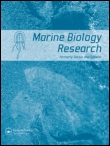
Marine Biology Research
Innovating research for thriving ocean ecosystems.Marine Biology Research is a premier journal published by Taylor & Francis, focusing on the dynamic field of marine biology and its intersecting realms of aquatic science, ecology, and oceanography. Since its inception in 2005, this journal has served as a crucial platform for researchers and professionals to disseminate their findings, with a vision extending to 2024 and beyond. The journal is recognized with a Q3 quartile ranking in both Aquatic Science and Ecology, Evolution, Behavior and Systematics, underscoring its growing influence in these fields as evidenced by its Scopus rankings. Located in the United Kingdom, Marine Biology Research aims to foster collaboration and innovation through open access options, facilitating knowledge exchange among the academic community. With a steady commitment to advancing marine sciences, this journal is an invaluable resource for those dedicated to understanding and preserving our ocean ecosystems.

OCEAN DYNAMICS
Navigating the Future of Ocean ScienceOCEAN DYNAMICS is a premier peer-reviewed journal published by Springer Heidelberg, dedicated to advancing the field of oceanography. With an ISSN of 1616-7341 and an E-ISSN of 1616-7228, the journal has established itself as a key resource for researchers and professionals interested in the dynamic processes of the world's oceans. As of 2023, it holds an impressive Q2 category ranking in Oceanography, placing it among the top journals in its field (Rank #34/145, 76th percentile in Earth and Planetary Sciences). Although operating under a traditional publishing model without open access options, OCEAN DYNAMICS continues to provide valuable insights and a platform for innovative research, boasting coverage from 2001 to 2024. Researchers and students alike will benefit from this journal's commitment to showcasing cutting-edge studies that enhance our understanding of oceanographic phenomena.